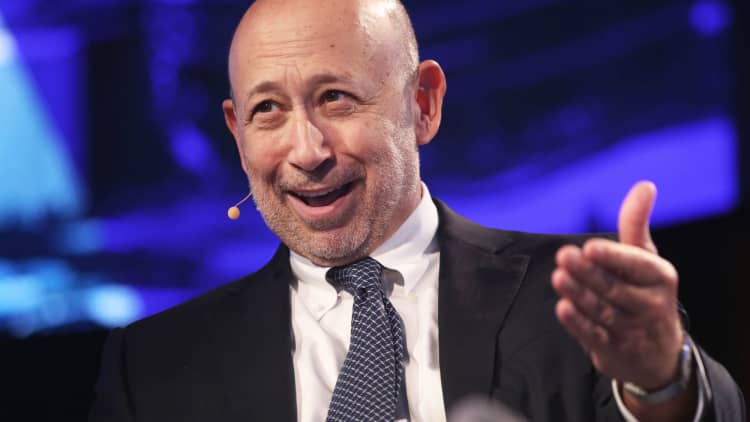
Goldman Sachs on Wednesday reported fourth-quarter earnings of $5.68 a share that topped Wall Street estimates. The company posted a net loss when factoring in a tax hit, largely because of a one-time charge for bringing overseas profits back to the U.S.
The investment bank titan also beat on revenue, reporting $7.83 billion against estimates of $7.61 billion.
However, trading revenues in the critical fixed income, currencies and commodities space plunged, falling 50 percent from a year ago. Trading revenue overall was down 34 percent.
The numbers come as Goldman looks to transition out of its long-time perch atop the trading business into other lines. Mergers and acquisitions continues to be a mainstay for the firm as it held its No.1 ranking on Wall Street, but the move away from the core business is coming with a cost.
Shares fell more than 2 percent on Wednesday as investors reacted to the poor trading results, as well as an update on the bank's tax rate this year. Goldman executives said on conference call that its effective tax rate will be 24 percent, higher than some on Wall Street had assumed would be the case in the wake of the tax reform bill.
The stock is up just 5.8 percent over the past year, during a time when the S&P 500 surged 22 percent as investors have been slow to warm to the new Goldman business model.
"That FICC trading number was shocking," Gerard Cassidy, managing director at RBC Capital Markets, told CNBC. "Their FICC trading numbers are so much weaker than their competitors."
In a news release, Goldman said trading was "a challenging environment characterized by low levels of volatility and low client activity." Equities revenue also fell by 14 percent.
"Last year, we delivered higher revenue and stronger pre-tax margins despite a challenging environment for our market-making businesses," Lloyd C. Blankfein, Goldman's chairman and CEO, said in a statement.
"With the global economy poised to accelerate, new U.S. tax legislation providing tailwinds and a leading franchise across our businesses, we are well positioned to serve our clients and make significant progress on the growth plan we outlined in September," he added.
Like its peers on Wall Street, Goldman had to take a paper writedown due to the tax reform legislation Congress passed in December. Including its $4.4 billion tax hit, the firm suffered a loss of $5.51 a share.
Goldman did see a stellar quarter in its investment banking operations, which saw $2.14 billion in net revenues for the quarter and $7.37 billion for a year, its second best ever.
Investment management also continued to be strong, producing $1.66 billion for the quarter, a 4 percent gain from 2016, with the full-year total of $6.22 billion reflecting a 7 percent increase.


